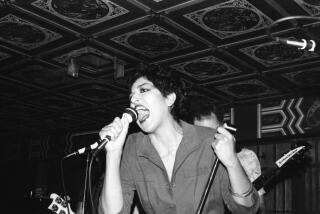WANG CHUNG: NO CHINESE CONNECTION
- Share via
Apparently some fans still think Wang Chung is a Chinese musician. “This guy came up to me and said, ‘Hi, Wa” laughed Nick Feldman, who plays keyboards and bass for the group. “Do I look Chinese to you?” He’s from North London and looks very English.
Then there are those who think Wang Chung is two Chinese guys, Wang and Chung. “No, I’m not Mr. Chung,” insisted lead singer Jack Hues in a deadpan tone. Hues, 31, was born in a town just outside London. He looks even less Oriental than Feldman.
Despite their Top Five single, the supremely danceable “Everybody Have Fun Tonight,” some pop fans obviously still don’t know much about this duo, which has been recording since 1982. It’s a group without much of an identity, musical or personal.
It was evident early during a recent West Hollywood restaurant interview why fans tend not to remember these two. They’re just ordinary nice guys, not ragingly charismatic, not terribly humorous, not exceptionally good-looking, not particularly outgoing. They leave a pleasant impression but not an especially strong one.
Musically, though, they leave a stronger impression. They’re versatile musicians--maybe too versatile. They lack a clear-cut musical identity because they’ve been through so many musical changes since making that first album, on Arista, in 1982. Up to 1984, this was a punkish outfit, boasting a jittery, atonal style that was “in” in hip rock circles back then. The single, “Dance Hall Days,” an international success in 1984, defined Wang Chung for a while.
“We were this English punk band that wasn’t doing as well as we wanted,” explained Hues, the more talkative of the two. “We wanted to be more concise musically, to write music that was more to the point. We also really wanted people to know about us, to know Wang Chung music.”
Even though Wang Chung had great exposure on a Cars tour and on MTV, there wasn’t much of a change in its low profile. The “Dance Hall Days” single was the most notable song on “Points on the Curve,” the band’s 1984 debut album for Geffen Records. The next album was expected to be punkish too, but maybe a little glossier and more commercial.
They wanted to avoid one thing in particular. “We didn’t want to make an album that was full of songs sounding like ‘Dance Hall Days, Part II’,” Feldman insisted.
But Wang Chung crossed up its fans, confusing them with a partly instrumental sound track for last year’s sordid cop drama “To Live and Die in L.A.” It was different from other Wang Chung albums. Much of it was esoteric and eerily atmospheric, sounding like toned-down Tangerine Dream tracks.
The sound-track album wasn’t a smash, but it got enough attention to color the Wang Chung image. For the duo, that punk sound seemed to be a thing of the past. Experimental instrumentals, it seemed, were apparently its new direction. Wrong again. On “Mosiac,” the group’s current album--and by far its biggest--Wang Chung turned away from edgy instrumentals to a slick pop sound.
“We wanted to broaden the sound and get further away from that English-band sound,” Hues explained. “We have nothing against being commercial either. ‘Mosiac’ is a very commercial album. We don’t mind reaching as many people as possible.”
Wang Chung has strong punk roots. When the members first played together in an avant-garde English band called 57 Men, punk, still the rage in England, was their inspiration. “Punk excited us then,” Hues said. “Self-expression was big then. It didn’t matter that you weren’t an expert musician. If you loved music and wanted to play, that’s all that mattered.”
Wang Chung used to be a trio. Hues, Feldman and drummer Darren Costin left 57 Men to form Wang Chung in 1981. Costin left Wang Chung a few years later, after the Cars tour but before the ‘To Live and Die in L.A.” album.
“The breakup was a mutual thing,” Hues insisted. “Nick and I wanted to Wang Chung to be the way we wanted to it to be. We wanted it to be experimental. We wanted to try this and that and do some offbeat stuff. Darren was intent on making a flagrantly commercial record. If we had stayed together, the tension between the two factions would have been horrible and very destructive.”
So Feldman and Hues, who were the primary composers, turned it into a duo. When they go on tour--the next one starts in February--they simply hire a band. “It’s better this way,” Feldman said. “Jack and I can get crazy. We can turn Wang Chung into whatever we want.”
What, by the way, does Wang Chung mean?
According to the record company biography, it’s “the sound produced by the sudden and quite deliberate striking of guitar strings.” Hues, however, said Wang Chung means something a bit different: “It’s an inaudible pitch . . . all music aspires to perfect pitch.”
But wait a minute. In their hit song, “Everybody Have Fun Tonight,” there’s the line: “Everybody have fun tonight/Everybody Wang Chung tonight.” What does Wang Chung mean in that context?
Feldman’s answer wasn’t very helpful. He replied: “It means anything you want it to mean.”
More to Read
The biggest entertainment stories
Get our big stories about Hollywood, film, television, music, arts, culture and more right in your inbox as soon as they publish.
You may occasionally receive promotional content from the Los Angeles Times.









